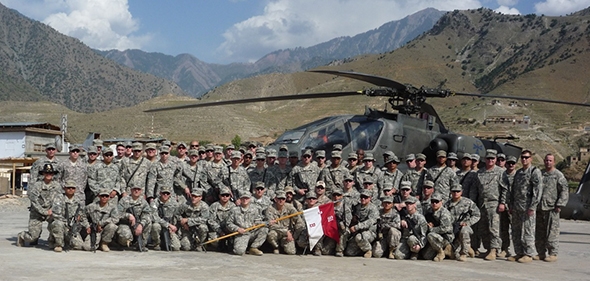As President Obama bestowed the Medal of Honor on Clinton Romesha for his valor in defending an isolated American outpost in Afghanistan from an overwhelming Taliban attack, he looked for lessons learned.

“One of them is that our troops should never, ever, be put in a position where they have to defend the indefensible,” Obama said at the White House ceremony for retired Staff Sgt. Romesha on Monday, February 11. Eight Americans died in the October 2009 battle for Combat Outpost Keating, one of the most vicious engagements of the war.
Romesha’s story and the stories of the other soldiers whose duty it was to defend the indefensible, including Capt. Stoney Portis MALS ’13, the last officer to command COP Keating, are told in a new book by CNN correspondent Jake Tapper ’91, The Outpost: An Untold Story of American Valor.
Tapper will return to Dartmouth on Tuesday, February 19, to join a panel discussion with photojournalist James Nachtwey ’70 and Portis at a lunch with students from the Graduate Studies Program and members of the Dartmouth Graduate Veterans Association. Nachtwey, an activist anti-war photojournalist, is the Roth Distinguished Visiting Scholar at Dartmouth.

At 4:30 p.m. Tapper will give a public lecture, “The Outpost: An Untold Story of American Valor,” at Filene Auditorium in Moore Hall. President Emeritus James Wright, a former Marine who taught Tapper in a first-year history class, will introduce his former student.
Wright has been waging a personal campaign to bring the real cost of the war in Afghanistan to the attention of the public and policymakers. In his recent book, Those Who Have Borne the Battle: A History of America’s Wars and Those Who Fought Them, he argues that the invisibility of modern war has made it too easy for politicians to expend American lives and treasure. Tapper’s book is important because it puts a human face on the war in Afghanistan, Wright says.
The John Sloan Dickey Center for International Understanding is sponsoring Tapper’s lecture. There will be a public book signing after the lecture.
